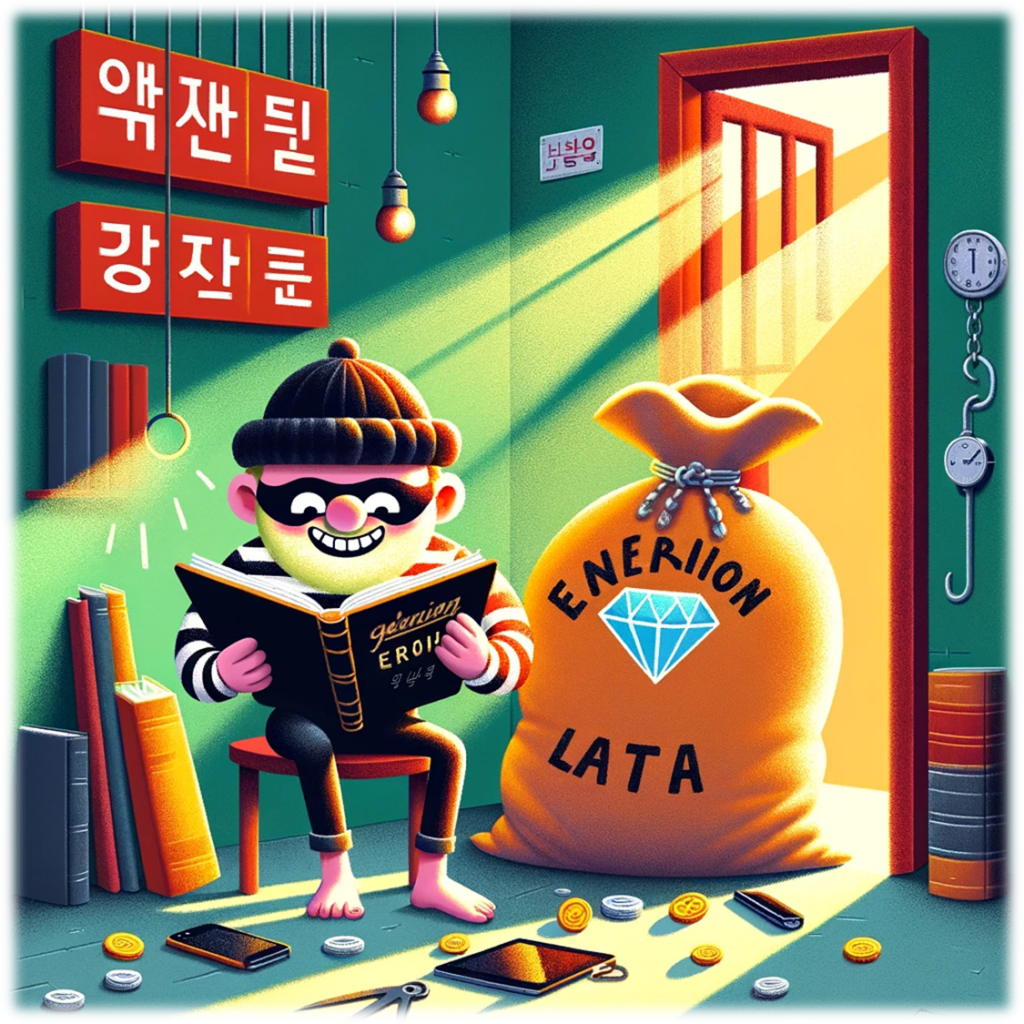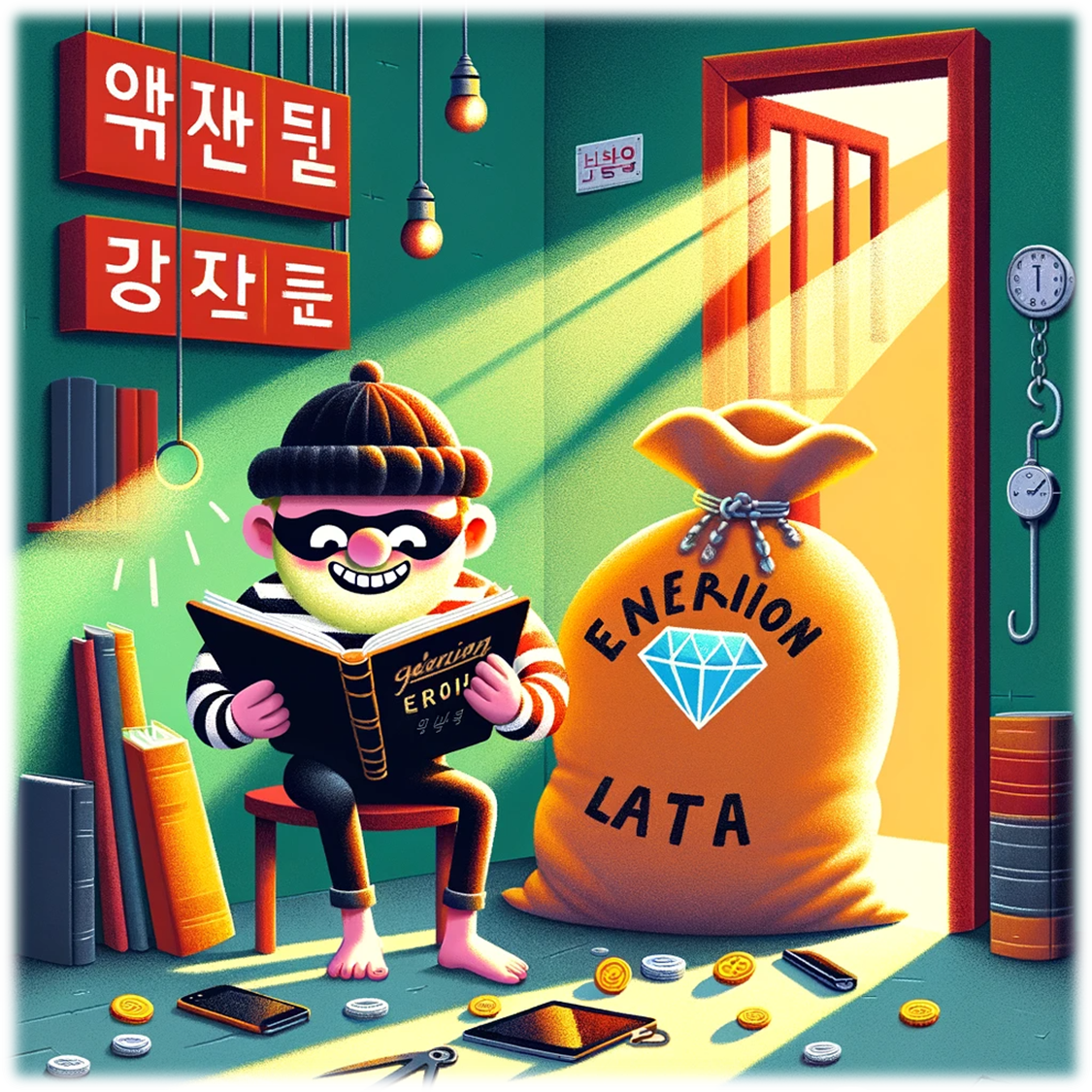” 저 사람 담배를 배우더니 골초가 되었어. 늦게 배운 도둑질이 날 새는 줄 모른다더니. “
” He learned to smoke and became a heavy smoker ‘ 늦게 배운 도둑질이 날 새는 줄 모른다. ‘ “

▶ 속담의 설명 (Proverb Explanation)
1. 속담 직역 (Proverb Literal translation) ▷▶ A thief who learned late doesn’t know when the dawn comes.
2. 속담 의미 요약 (Proverb Summary)
• This means that someone who starts doing something, especially something bad, later in life may become excessively engrossed in it, not knowing when to stop.
3. 유사 속담 (Similar Proverb)
• Old habits die hard.
4. 속담 상세 정보 (Detail Information of Proverb)
“늦게 배운 도둑질이 날 새는 줄 모른다”라는 속담은 인생의 늦은 시기에 무언가를 시작한 사람, 특히 좋지 않은 일을 시작한 사람이 그 일에 지나치게 몰두하여 적절한 시점에 멈추는 것을 모른다는 것을 의미합니다.
늦게 도둑질을 배운 사람이 밤을 새워 도둑질에 열중하다가 해가 뜨는 것도 모르는 것처럼, 이 속담은 새로운 습관이나 행동, 특히 부정적인 것들에 대해 무절제하게 빠져들 수 있는 경향을 나타냅니다.
이는 새로운 습관이나 행위에 대한 자제력 부족을 비유적으로 표현합니다.
The Korean proverb “늦게 배운 도둑질이 날 새는 줄 모른다,” which translates to “A thief who learned late doesn’t know when the dawn comes,” suggests that someone who starts something later in life, especially a bad habit or behavior, may become excessively absorbed in it without knowing when to stop.
Like a late-learner thief so engrossed in thievery that they don’t notice the break of dawn, this saying illustrates the tendency to become unrestrainedly engrossed in new habits or actions, particularly negative ones.
It metaphorically represents a lack of self-control in new habits or behaviors.
속담 예시(proverb example) 1)
- 상황: 중년에 도박을 배운 사람이 도박에 중독되어 문제를 일으킵니다.
- Situation: A person who learned gambling in midlife becomes addicted and creates problems.
- 사용: “그는 늦게 도박을 배웠지만 지금은 제어할 수 없을 정도로 중독되었어요. ‘늦게 배운 도둑질이 날 새는 줄 모른다’와 같은 상황이죠.”
- Usage: “He learned gambling late but now is so addicted that he can’t control himself. It’s like ‘a thief who learned late doesn’t know when the dawn comes.'”
속담 예시(proverb example) 2)
- 상황: 늦은 나이에 소셜 미디어를 시작한 사람이 하루 종일 소셜 미디어에 몰두합니다.
- Situation: Someone who started using social media at a later age becomes engrossed in it all day long.
- 사용: “그녀는 소셜 미디어에 너무 몰두해서 다른 일을 거의 하지 않아요. ‘늦게 배운 도둑질이 날 새는 줄 모른다’라고 할 수 있습니다.”
- Usage: “She’s so absorbed in social media that she hardly does anything else. It’s a case of ‘a thief who learned late doesn’t know when the dawn comes.'”
5. 속담 속 오늘의 단어(Vocabulary in Proverb)
| 오늘의 단어 | |
| 배우다. | learn |
| 늦게 | late |
| 도박 | gambling |
| 중년 | midlife |
| 중독되다. | addicted |
| 일으키다. | create |
| 하루종일 | all day long |
| 몰두하다. | engrossed |
| 거의 – 하지 않다. | hardly |
▶ 속담 마무리(Conclusion)
The proverb “A thief who learned late doesn’t know when the dawn comes” is often used to describe someone who becomes excessively involved in a new activity or habit, particularly a harmful one, to the point of losing track of time and other responsibilities. This saying highlights the potential danger of becoming too engrossed in something, especially when it’s a negative behavior or habit acquired later in life. It serves as a warning about the risks of overindulgence and the importance of maintaining balance and self-control.
May this proverb remind you of the need for moderation and awareness, especially when engaging in new activities or habits. It’s a call to be conscious of the time and energy invested in any pursuit and to ensure that it doesn’t lead to negative consequences or neglect of other important aspects of life.
‘늦게 배운 도둑질이 날 새는 줄 모른다’라는 속담은 새로운 활동이나 습관, 특히 해로운 것에 지나치게 몰두하여 시간이나 다른 책임을 잊어버리는 사람을 묘사하는 데 자주 사용됩니다. 이 속담은 특히 인생 후반기에 취득한 부정적인 행동이나 습관에 너무 몰두하는 것의 잠재적 위험을 강조합니다. 과도한 몰두의 위험과 균형과 자제력 유지의 중요성에 대한 경고로 작용합니다.
이 속담이 새로운 활동이나 습관에 참여할 때 절제와 인식의 필요성을 상기시켜 주길 바랍니다. 어떤 추구에 투자하는 시간과 에너지에 대해 의식하고, 그것이 부정적인 결과를 초래하거나 생활의 다른 중요한 측면을 소홀히 하지 않도록 하는 것이 중요합니다.
녹음 된 소리를 들으면서 공부하기 (추후 제공 예정)
이 곳은 향후에 해당 속담 포스팅의 한글을 원어민이 읽어주는 녹음본이 게시될 예정입니다. 여러분들의 한국어 공부에 도움이 되고자 노력 중이니 잠시만 기다려주세요. 감사합니다. This space will soon feature a recording of the post being read by a native speaker in Korean. We are working hard to assist with your Korean studies, so please stay tuned. Thank you. 이 곳은 향후에 해당 속담 포스팅의 한글을 원어민이 읽어주는 녹음본이 게시될 예정입니다. 여러분들의 한국어 공부에 도움이 되고자 노력 중이니 잠시만 기다려주세요. 감사합니다. This space will soon feature a recording of the post being read by a native speaker in Korean. We are working hard to assist with your Korean studies, so please stay tuned. Thank you.
다른 속담 링크
